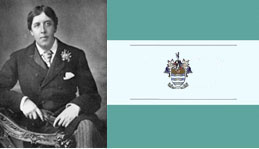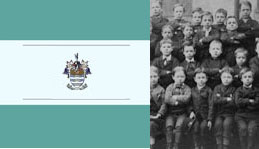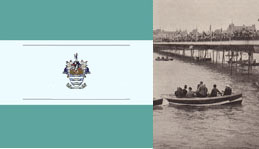

Further Information about Alphonse Conway’s Origins
Since Oscar Wilde’s Scandalous Summer was published, further information has come to light regarding Alphonse Conway’s background, and it is included here for the benefit of the historical record.
The section from the book that appears at the bottom of this page goes into some detail about Alphonse’s name and origins.
In his Amazon review of the book in September 2016 (in a passage not included in the extract from the review that appears on this website), Edmund Marlowe noted that he had tracked down Alphonse Conway’s birth certificate.
Remarkably, this adds yet more names to the multiplicity already associated with the boy and his mother.
The birth certificate confirms that, as the 1891 census also records, Conway was born in Bognor. The date of birth given on the certificate is 13 July, rather than 10 July, but it is reasonable to assume that the date of registration rather than the date of birth must have been inadvertently entered.
The mother’s forenames on the birth certificate are Sarah Julia, as elsewhere in the historical record, but her surname is given as Payne – a new surname for this woman of many names.
Marlowe adds: “Unlike in the baptismal register, no pretence is made that he was legitimate, so the space for his father's name has a line through it and at that time he bore his mother's surname of Payne.”
On the birth certificate the boy’s forenames are given are Alfonso Conway White.
Conway and White are usually both surnames rather than forenames, and Conway was almost certainly Sarah’s maiden name, to which she had reverted by the time she came to live in Worthing.
The assumption follows that Alphonse’s father’s surname was White. If this was indeed the case, it is unexpected that two parents with commonplace English surnames should choose such a foreign a name as Alfonso / Alphonso / Alphonse for their son. This was long before it was common for people to choose pretentious or silly forenames for their offspring. There must, therefore, have been something European in the antecedents of one or other parent.
Interestingly, a Sebastian Alphonso White was born in Catherington, Hampshire in 1850. Catherington is only about 25 miles from both Petworth and Bognor, so we are very much in the right part of England - and indeed a male born in 1850 would have been the right age to have been Alphonse’s father. Unfortunately, however, this Sebastian Alphonso White died as a baby, in the year of his birth. It nonetheless seems possible that this child was related in some way to Alphonse Conway’s father, who would have been born at around the same time.
It is unlikely it will ever be known for certain what was Alphonse Conway’s usual and / or “official” first name, not least because there does not seem to have been consistency in this regard. While Alphus – the version that appears in the 1891 census - can be discounted as a transcription error, it is probable that at different times and in different contexts Alfonso, Alphonso and Alphonse were all used by the boy or by those associated with him.
When Carson, at the libel trial, asked Wilde how old Alphonse was, Wilde replied ‘about eighteen’. This was disingenuous. A document has recently become available that gives Alphonse’s date of birth. This is the record at St Andrew’s Church, Worthing of the boy’s baptism on 28 March 1891, which records his date of birth as 10 July 1878. He was thus twelve years old when he was belatedly baptised, and about six weeks past his sixteenth birthday when he met Wilde. On the baptism record Alphonse’s mother’s first names are shown as Julia Sarah. His father’s name was also Alphonse also, and he is shown as ‘deceased’.
There is confirmation of Alphonse’s age in another source, the April 1891 census, the only census in which there is any trace of either Alphonse or his mother. Sarah Conway is the head of the household at 2 Warman Terrace, Teville Road, Worthing. She is a widow, forty-two years old. She was born in Petworth, twenty miles from Worthing. She is listed as ‘of independent means’, a phrase that indicated merely that she was not in formal employment. Her son, ‘Alphus’, is a ‘scholar’ – that is, a schoolboy – and is twelve years old. He had been born in Bognor, eighteen miles west of Worthing. ‘Alphus’ was presumably the guess that the census enumerator made when confronted with the semi-legible schedule that Sarah had completed.
As we shall see in a moment, Conway was almost certainly Sarah’s maiden name rather than a married name. If so, her father was probably John Conway, who was living in New Street, Petworth at the time of the 1841 census. He is shown as a general dealer aged thirty-seven, and thus would have been born about 1804. He does not feature in the 1851 census – nor does Sarah – but a John Conway of Petworth died some time during the first three months of 1859. If Sarah was indeed his daughter, she was left fatherless at the age of about ten.
In books about Wilde, Conway’s first name appears in three versions: Alphonse, Alphonso and Alfonso, but the fact that both his and his father’s name appear as Alphonse on the baptismal record indicates that Alphonse is correct.
It cannot be a coincidence that Alphonse’s baptism occurred just eight days before the official date for the 1891 census. Then, as now, there were penalties for entering incorrect information on the census records, and Sarah’s sudden decision to get her son baptised at the age of twelve was almost certainly because she hoped that his baptismal record – however recent and belated – would give semi-official status to the surname which her son was using, and which she was about to enter on the census.
When Alphonse was baptised, ‘Alphonse’ was, as we have seen, entered as the father’s first name in the parish register. The widowed status that Sarah declared would lead to the assumption that the father’s surname was Conway also. In reality, however, Sarah was almost certainly never married to Alphonse’s father. Not only is there no trace of an Alphonse Conway senior in any of the historical records; it is in any case unlikely that any such person existed.
Alphonse is not an English name. Almost every Alphonse recorded in nineteenth-century censuses had a French surname and had been born in France, Belgium or the Channel Islands; there is also the occasional Alphonse from Germany or Italy. The existence of two generations of Alphonse Conways would posit that there was an original Alphonse in the family in a previous generation – an entirely foreign individual with a foreign surname, who had been the brother or the father of the Worthing boy’s paternal grandmother – and that the foreign first name ‘Alphonse’ was improbably carried down to two generations of Conways.
So Alphonse was almost certainly illegitimate; and his true surname was not Conway.
During the Queensberry libel trial Wilde said that Conway’s father had died young. However he was already absent from Sarah’s life when she first appeared in Worthing – which, as we shall see in a moment, was only four years or so after her son’s birth – so they probably never co-habited.
At the libel trial, Wilde also said that the boy had told him that his father had been an electrical engineer and, if this was not an invention of Alphonse’s – or of his mother’s – it seems curious that a boy born into a respectable lower-middle-class family in 1878 was not baptised at birth. There would, however, have been good reason for this omission if embarrassing details indicative of illegitimacy would have had to be entered onto the church register. In addition it is possible (see Appendix G) that Alphonse’s father was a convicted criminal. With the passage of time, however – and in a town at a safe distance from that of the boy’s birth – it would have been easy to enter on the records a father now conveniently deceased.
The first Worthing directory in which Sarah’s name appears is that of 1884. Mrs J. Conway – as we have seen, Julia was Sarah’s first name – is listed at 2 Western Terrace, West Street in the Worthing Directories of 1884, 1885, 1886 and 1887. No other Conways appear in Worthing directories of the period: it was not a Worthing name.
Frustratingly, the relevant page in the copy of the 1883 directory at Worthing Library is missing, so we do not know if she was listed in that year. She does not appear in the 1882 edition.

